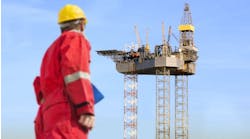Emtunga at forefront of global offshore accommodation boom
Nick Terdre
Contributing Editor
Swedish fabricator Emtunga has strength- ened its worldwide reference list with contracts for living quarter modules for projects in Thailand and the GoM.
The Thai contract, for state oil company PTTEP’s Arthit project, calls for a 1,500-tonne module housing 180 beds in two-man cabins. The module will be built in sections at the company’s production plant in Gothenburg and will be shipped next summer to a local fabrication site where Emtunga, part of the Pharmadule Emtunga group, will perform hook-up. This is the contractor’s second job for PTTEP - the company was co-client for the Cakerawala living quarters, delivered in 2001.
Emtunga has also landed a contract for a large project in the GoM. Here it is a partner to the main contractor, which is responsible for construction and installation of two living quarter platforms. While the main contractor will undertake jacket engineering and fabrication, Emtunga is designing and building two identical living quarter modules, each weighing around 2,000 tons and accommodating 240 men in four-man cabins.
The modules will be built in sections and shipped to a local fabrication site next summer. Emtunga will also hook up the quarters once they have been assembled on the main deck frame. Offshore installation is scheduled for the 3Q 2006.
BP backlog
Emtunga is currently working at full capacity. It recently delivered a 24-man additional quarters unit to BP’s Schiehallion FPSO in the UK sector, and it is currently building a 40-man extension module for Transocean’sDeepwater Discoverydrillship, due for delivery by year-end, and a fourth accommodation module for BP’s ACG project in the Azerbaijani sector of the Caspian Sea.
Shipment out of Sweden of the ACG module sections is scheduled for May next year, with the completed unit due to be handed over in July 2007. Weighing 1,150 tons and with 198 beds, this module is identical to the previous three delivered to the project, for Azeri Central, Azeri West and Azeri East.
“The sequence of deliveries has allowed both BP and Emtunga to appreciate the benefits of standardization,” says marketing and sales manager Klas Wallin. For the contractor, savings have been generated mainly in the engineering and hook-up phases. “We thought we’d get savings on the second unit of around 10%, and we did,” Wallin says. “But we were pleasantly surprised to get a further 8-9% on the third one. Now we’re looking for another 5-6% on the fourth one.”
Standardization also fits in with the strategy of 3i, which earlier this year took over the Pharmadule Emtunga group. “According to our owner, we are involved in an industrial rather than an entrepreneurial activity,” says Wallin. “So the more we can standardize, the better.”
However, it is the customer that has the final say, and although some oil companies, like BP, appreciate the advantages of standardization, others like to start each project with a blank sheet of paper. Such an approach contrasts with rig and vessel owners, another important client group for the company, which tend to put the emphasis on a low-cost product, which meets the regulatory requirements. “We can achieve the lowest-cost outcome if the customer allows us to put our experience into the project and decide the details ourselves,” says Wallin.
Asia-Pacific, West Africa
With a share of around 70% in the North Sea market, where the number of new field developments requiring accommodation is anyway limited, Emtunga’s best opportunities for winning fresh work are in areas such as the Far East and West Africa.
The company has been looking into opportunities for reducing costs by performing part of the fabrication in lower-cost countries than Sweden. Some such facilities have been identified, for example in Estonia, where the Pharmadule Emtunga group, which also designs and builds pharmaceutical and telecom modules, has had telecom modules built.
Emtunga’s familiarity with North Sea standards, and especially the Norsok standards applied in Norway, could help it to win work from Far East shipyards. Some of these yards are struggling to cope with the boom in offshore orders triggered by high oil prices and have suggested that one way of managing the high workload could be to subcontract Emtunga for some of the more demanding accommodation projects.
Another possible source of new orders could be the owners of laid-up rigs contemplating reviving their units and upgrading them prior to putting them on the market.•
For more information contact Klas Wallin, Pharmadule Emtunga. Tel +46 31 794 1335, fax +46 31 794 1308, [email protected], www.emtunga.com




